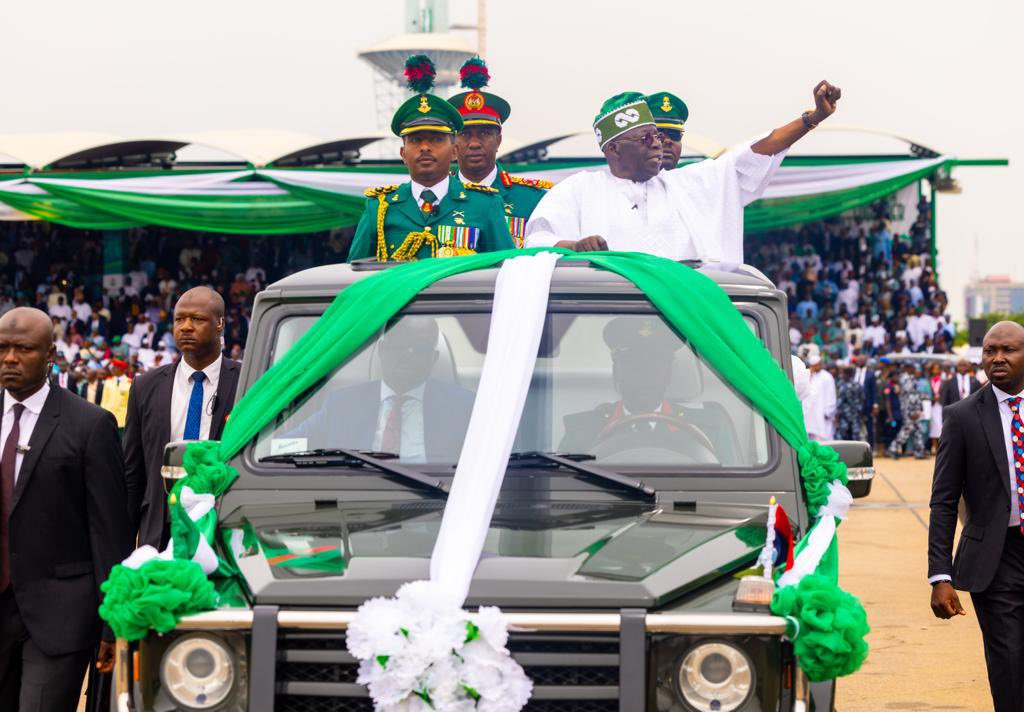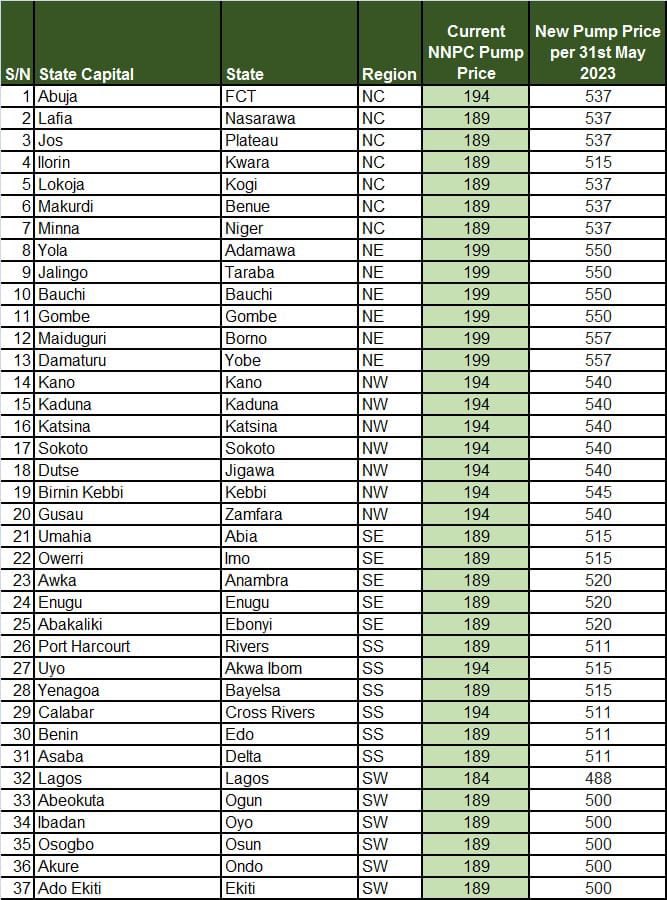If this government fails, as all others before them have, it may prove more disastrous than in previous times, for the economic environment in Nigeria has changed in the last eight years…
By Chimezie Chika
Tinubu’s Inaugural Speech and Fuel Subsidy Removal
On May 29, 2023, Asiwaju Bola Ahmed Tinubu, who was declared winner of the 2023 presidential election, was finally inaugurated as only the 7th democratically elected President of the Federal Republic of Nigeria. In his first speech as president, Tinubu, among other things, announced the removal of the fuel subsidy. “Fuel subsidy is gone,” he said, adding that “subsidy can no longer justify the ever increasing cost in the wake of buying resources.” It was a decision that was anticipated in certain quarters in the days leading up to the inauguration of the president.
Tinubu’s decision is definitely not a bolt from the blue. It is the culmination of erratic changes that has been happening in the last decade and a half when subsidy became noted as a major problem of Nigeria’s fiscal policy. The World Bank, the IMF, and other economic organisations, have repeatedly advised that fuel subsidy must be removed if Nigeria intends to move forward in its bid towards a better management of its volatile economy. Such a move will free up the much needed funds for important infrastructural projects that will benefit the country in the long run. It appears that the Muhammadu Buhari administration had already taken that decision in the 2023 budget, with Tinubu noting in his address that the 2023 budget made no provisions for fuel subsidy. There is a general agreement that Tinubu’s statement was the most logical line of action for any new government that succeeds Buhari.

(Read also: Has the INEC Fufilled All Its Promises?)
While the fuel subsidy removal was lauded in some quarters as the right decision to take, others noted that the corollary of such a decision will be too steep a price for Nigerians to pay. In an interview on Arise TV, Bongo Adi, a professor of Economics at the Lagos Business School, noted that it was better to remove the subsidy now and go through all the rounds of issues that will come with it than wait for a later time when things might become too dire. It is a view that agrees with what Peter Obi, the Labour Party presidential candidate, said during his 2023 presidential elections campaign, in which he told an interviewer, in an acute analysis of economic issues weighing the country down, that his first action as a sitting president would be to remove fuel subsidy since it was stunting the development of other critical sectors of the economy at an alarming rate, costing double the national budget. Nigeria no longer has the luxury to sustain such an anomalous expenditure, he stated. The Independent Petroleum Marketers Association of Nigeria (IPMAN), the flagship organisation of petroleum sellers in Nigeria, has maintained that they were against the removal of fuel subsidy. Its reason: “We are not in support of the removal of fuel subsidy at this time. We have said it repeatedly that our refineries should be fixed before taking such decision that will cause galloping inflation and inflict more hardship on the masses.”
A sudden seismic shift in fuel prices had followed Tinubu’s speech. Pump prices more than doubled across the country, marked by the long queues of panic buyers and followed by exorbitant transport fares. It is reasonable to believe that this is only a few in a series of economic disruptions that will take place in the wake of the removal. What many do not understand is why this has to happen so quickly when the fuel subsidy removal will only become official in June. Is it also part of the decision of the federal government? The Nigerian National Petroleum Corporation (NNPC) cleared any further doubts as to the origins of the recent hike in prices when it revealed, on May 30, 2023, that it has enough fuel in storage to last at least one month, and urged people to stop panic-buying. Only one conclusion suffices to explain the situation: petroleum marketers are hoarding fuel barely twenty-four hours after. However, the next day, on May 31, the NNPC put out another statement expressing its regrets that pump prices at their retail outlets have to be adjusted “in line with the current market realities.”
The History of Fuel Subsidy in Nigeria
Fuel subsidy is a government initiative that involves the direct payment of money to petroleum marketers by the government in order to reduce the retail price of fuel across the country. Subsidies range across different sectors of the economy of a country, with the goal of reducing the price burden on citizens. The government subsidises expensive commodities by partly paying for them, so that they can be sold at a level below international prices in the country. Fuel subsidy in Nigeria was a policy that began in the 1970s — finally approved by the federal government in 1977 — in response to the oil price shock of 1973, a global spike in oil prices which was immediately reflected on the local scene at a level never before seen. It forced the government to take drastic measures to mitigate the situation. But it was supposed to be a short-fuse solution to be scrapped once Nigeria had built the refineries to meet its domestic demands. It was not to be.
In 2000, when oil production in the country’s three refineries continued to dwindle, a committee was constituted by the Nigerian government to review petroleum pricing and distribution. The recommendations of the committee led to the establishment of a Petroleum Products Pricing Regulatory Committee (PPPCRC). After it was established, as the Petroleum Products Pricing Regulatory Agency (PPPRA), the agency was charged with adjusting local petroleum prices to reflect changes in global oil prices using a price modulation mechanism. The system ensured that high or low oil prices were regulated accordingly through the price of petroleum products to prevent shortages and for the equal benefit of consumers and independent petroleum marketers. Through the PPPRA, the NNPC and licensed importers bring in refined petroleum products into the country. These products are then sold to independent petroleum marketers at regulated prices subsidised by the government. Petroleum marketers are then able to sell to consumers at a rate far below international rates.
Different regimes and governments have sustained this policy in the decades since. In the 1970s, during the oil boom, the policy seemed necessary and appeared to have no adverse monetary effects on government fiscal policy. In the ensuing years, fuel subsidy began to come up as constituting more of a problem than a solution to Nigeria’s economic problems. By 2011, when Nigeria spent a mind-boggling 2.1 trillion naira on fuel subsidy alone, it was clear that something had to be done. Between 2005 and 2018, over $60 billion dollars was expended on fuel subsidy. The manner in which the fuel subsidy has been handled has encouraged widespread corruption and bogus budgetary estimates. In 2022 alone, Nigeria spent a staggering $10 billion on fuel subsidy. Identifying that the fuel subsidy regime has become a leech on the Nigerian economy, international organisations repeatedly advised its removal.
Several attempts to reform Nigeria’s oil policy have proved futile, since a large percentage of the Nigerian population strongly opposes fuel subsidy removal as one survey shows. This view is not without cause. The removal of fuel subsidy means that Nigeria will have to revert to the vagaries of international prices, a situation that comes with its own problems.
(Read also: Tribalism in Africa: A Tool for Charging Political Agenda)
What Is the Reality Now?
The removal of fuel subsidy is one of the biggest policy decisions that is bound to help Nigeria refocus its commitment towards development across important sectors such as education, health, infrastructure, and release more funds for debt-servicing. The question is whether the time is right to make this decision. Another question that hovers the air with terrible portends is whether resources have been put in place to solve the problem of refined crude. For one thing, Nigeria’s three refineries in Warri, Port Harcourt, and Kaduna are not functional, even with the enormous investment — to the tune of $26 Billion so far — that has been made towards that goal. Another is the question of Nigeria’s porous oil laws. The poor structure of Nigeria’s oil policy has led to massive thefts and pervasive corruption in the crude oil sector. Poor accountability has mired Nigeria’s oil exports; one of the most scandalous was when a 2019 audit of the NNPC revealed that 104 million barrels of crude oil was not accounted for. The value of oil that comes to Nigeria is not commensurate with the tremendous amount of crude that leaves its shores. It is simply shocking to discover how much Nigeria loses in all sorts of schemes and dubious rackets given fancy names such as “policy” and “investment.”

In 2021, with these issues in mind, the Buhari administration passed the Petroleum Industry Bill into law which seeks to provide legal, governance, regulatory and fiscal framework for the petroleum industry in Nigeria. The Petroleum Industry Act, which replaced the old Petroleum Act, through its extensive provisions, is supposed to create investment opportunities and help the country utilise fully its crude resources for Nigeria’s economic development. The removal of fuel subsidy in the 2023 budget, which Tinubu only affirmed, is part of the larger provisions of the Petroleum Industry Act. Yet there are clearly no easy fixes. Implementing anything in Nigeria has proved over the years to come with more failures than successes. There are powerful interest groups that are not in favour of extensive revisions to the petroleum sector. Old demons want to prevail, and it will be interesting to see how the new government jumps through the visible and invisible hurdles before it.
If this government fails, as all others before them have, it may prove more disastrous than in previous times, for the economic environment in Nigeria has changed in the last eight years. Inflation is no longer the ailment that everyone complains about from time to time; it has become a palpable epidemic. In the last eight years, the government has resorted to borrowing to finance budgets since corruption and fluctuating prices means that revenue from crude oil exports is not enough anymore. In just eight years, Nigeria’s public debt has risen to $106 billion. Budget allocation on infrastructure is at an all-time low. The deregulation of the oil sector is sure to bring intense economic hardship on Nigerians. Protests and unrest might follow. In fact, the forecast, however one chooses to look at it, is a bleak one, if measures are not taken.
In the coming months, it is not hard to see what will happen, if attenuating policies are not implemented swiftly to nip the major effects of fuel subsidy removal on the masses. In a nation whose history has been pockmarked by long dystopian tales of chronic fuel shortages, images of long meandering queues stretching for kilometres outside petrol stations, and the ever-erratic high prices of petrol products, even while derricks and rigs continue to pump sweet crude from the vast delta of the Niger, there is urgent need for the Tinubu government to come up with proactive solutions that will mitigate the domino effect on the economy so that the masses can breathe a little easy as they wait for the expected benefits to finally kick in.
Chimezie Chika’s short stories and essays have appeared in or forthcoming from, amongst other places, The Question Marker, The Republic, The Shallow Tales Review, Isele Magazine, Lolwe, Efiko Magazine, Brittle Paper, and Afrocritik. He is the fiction editor of Ngiga Review. His interests range from culture to history, art, literature, and the environment. You can find him on Twitter @chimeziechika1.




